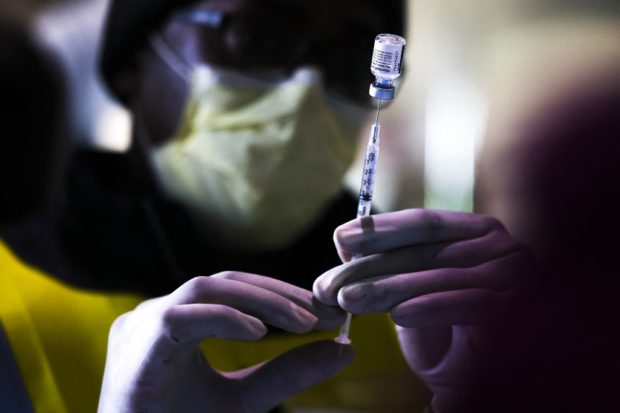
FILE PHOTO: Pharmacy technicians prepare doses of the Pfizer-BioNTech vaccine at a mass COVID-19 vaccination event on January 30, 2021, in Denver, Colorado. Michael Ciaglo/Getty Images/AFP (Photo by Michael Ciaglo / GETTY IMAGES NORTH AMERICA / Getty Images via AFP)
Washington, United States — False claims that COVID-19 vaccines can cause infertility are discouraging Americans from receiving the shots and leaving health professionals to persuade patients that scare stories they have read online are unfounded.
Among the worst examples of such misinformation spread on Facebook are that immunized men can render unvaccinated women sterile through sex, that 97 percent of vaccine recipients will become infertile and that the jabs could be “sterilizing an entire generation.”
With vaccine uptake already slowing, the claims are a threat to the Biden administration’s goal of achieving herd immunity in the United States.
Research published earlier this month showed about two-thirds of those who said they will “definitely not” get a vaccine were worried about the impact on their fertility.
And about half of unvaccinated people say they are concerned “the COVID-19 vaccine may negatively impact their fertility in the future,” Ashley Kirzinger, associate director of public opinion and survey research at Kaiser Family Foundation, a health policy nonprofit that conducted the study, told AFP.
Some 50 percent of women and 47 percent of men aged 18 to 49 who had not yet been vaccinated say they have such fears.
‘No evidence’
The initial exclusion of pregnant women from COVID-19 vaccine trials created space for falsehoods, and the latest effort by anti-vaccine groups coincides with fewer people stepping forward for inoculations.
“They are largely just recycling things that scare people about previous vaccines onto these new vaccines, whether or not it makes scientific sense,” said Devon Greyson, health communications professor at the University of Massachusetts Amherst.
The messages are targeting women because “fertility is just one of those things that we react so strongly to, and it’s so personal,” Greyson added. “So if you’re looking for a bogeyman, ‘It will make you infertile’ is a really good one.”
Katharine O’Connell White, associate professor of obstetrics and gynecology at Boston University School of Medicine, agreed, saying that “concerns about fertility with the vaccines strike at the heart of what it means to be a woman, for a lot of women.”
The American College of Obstetricians and Gynecologists, the American Society for Reproductive Medicine, and the Society for Maternal-Fetal Medicine said in a joint statement that “there is no evidence that the vaccine can lead to loss of fertility.”
Despite more than half a million Americans dead from COVID-19, vaccine hesitancy persists and it has left physicians having to assure patients that their fears about not being able to have children are misplaced.
‘Boring old truth’
“I tell my patients all the time, print out whatever you find that makes you nervous, makes you scared. And let’s talk about it,” White said.
But most vaccine skeptics do not believe their doctor or do not seek their advice.
Abinash Virk, an infectious diseases physician and co-chair of Mayo Clinic’s Covid-19 vaccination effort, said people who are staunchly against receiving the vaccine either do not ask or do not come in at all.
A history of women’s health concerns being more likely to be dismissed by health care professionals compounds the problem.
“The needs of women historically have not been included in research studies. Often it’s because the person designing the research study is not a woman,” White said.
With women often the default healthcare managers of their families and the decision-makers on whether to vaccinate their children, debunking misinformation is especially important as the US has opened up Pfizer-BioNTech vaccines to children 12 and older.
A large part of the population, including children, will need to be inoculated to achieve herd immunity, when the proportion of people with antibodies largely prevents the spread of the virus.
And vaccine falsehoods obstruct authoritative health guidance.
“Misinformation is sticky,” White added. “It’s much stickier than the boring old truth.”